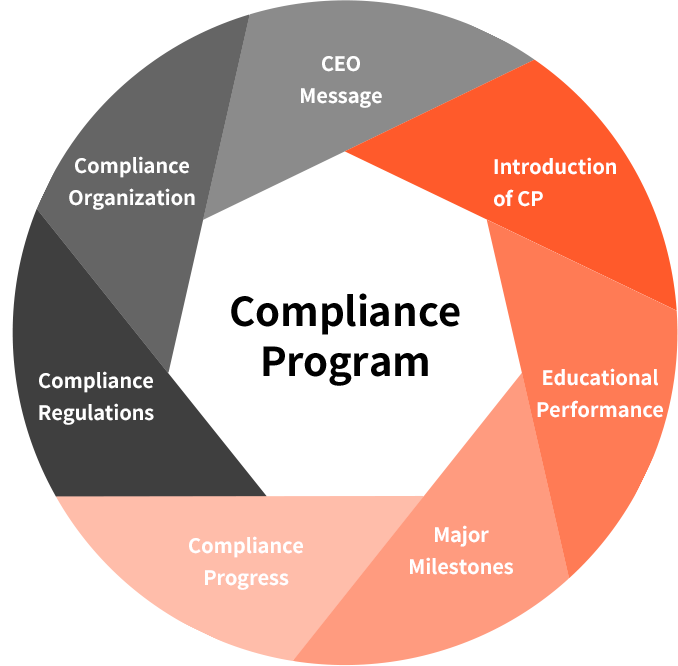Maxiplus
EN
Maxiplus
Global Healthcare Group
The Best Partner for You
Global Healthcare Group
The Best Partner for You
Ethics
Management that places corporate ethical compliance with an assertive attitude as the code of conduct
Compliance Program
Compliance
Program
Our entire staff is working hard so that MAXIPLUS MEDICAL & PHARMACEUTICAL can achieve the corporate mission of “offering total solutions (pharmaceutical products, services) through the most valuable methods that can contribute to improving the quality of life of customers.” Furthermore, we place the utmost value in ‘corporate ethics’ in the management and business activities of the company to pursue transparent, fair and reasonable work progresses.
In order to create a ‘structure where not a single case of CP violation occurs’, the employees of MAXIPLUS MEDICAL & PHARMACEUTICAL operate a compliance program based on the seven major elements of the CP.

Fair Trade Autonomous Compliance Program Operating Guidelines
Regulations related to fair trade
This refers to laws that the Fair Trade Commission has jurisdiction over such as the Monopoly Regulation and Fair Trade Act and the Act on Fair Labeling and Advertising.
All employees must be sufficiently aware of the precautions stipulated by the fair trade laws and comply with them thoroughly.
All employees must be sufficiently aware of the precautions stipulated by the fair trade laws and comply with them thoroughly.

Implementation of the seven core elements
- In order for a company to be recognized as having implemented CP, the following conditions must be satisfied.
- However, according to the Framework Act on Small and Medium Enterprises, Condition 4. may be set as the recommendations for SMEs.
- The seven major elements are the most important fundaments for implementing corporate law-abiding cultures and establishing a fair trade order.
- Condition 1. Proclamation of the will and policies for autonomous compliance by the CEO
- The CEO’s will and policies for autonomous compliance with laws related to fair trade shall be conveyed to all employees through the fair trade proclamation ceremony or documents (including electronic documents).
The CEO must appoint the autonomous compliance manager with the resolution of the board of directors, and if necessary, shall reorganize the body needed to implement the autonomous compliance program and provide the necessary resources for its efficient operation.
The CEO shall, through discussions with the autonomous compliance manager, provide training to employees on complying with fair trade laws and to prevent violations of the laws. If necessary, the CEO shall make efforts to spread freedom and fair competition cultures such as holding training programs or events related to fair trade laws and autonomous compliance programs for vendors, etc. - Condition 2. Appointing autonomous compliance manager in charge of the operation of the CP
- The autonomous compliance manager shall be appointed by the board of directors and his/her appointment shall be notified to all employees.
The autonomous compliance manager shall be appointed from senior managers with good insight on fair trade laws and the company’s policies and procedures, and by principle, shall be a person who is not in charge of operations such as sales, purchasing and procurement, labeling and advertisement, customer, support, etc.
The autonomous compliance manager shall oversee the organization and operations for complying with fair trade laws and for establishing and executing an autonomous compliance program, and it shall have the rights and responsibilities on the enactment and revision of the autonomous compliance handbook, and planning, establishment, execution, monitoring, improvements and operations, etc. for the autonomous compliance program. - Condition 3. Production and distribution of autonomous compliance handbook
- An autonomous compliance handbook shall be produced and purchased under the supervision of the autonomous compliance manager based on the code of conduct and compliance regulation standards to establish competitive order, and it shall be distributed to management and employees in fields where there are high possibility for violations of laws on fair trade such as the sales department.
Presenting clear codes of conduct and judgment standards can help prevent legal violations, while enhancing fair trade competencies. - Condition 4. Implementation of continuous and systematic autonomous compliance training
- Training (including online video training) for preventing fair trade law violations shall be held for at least two hours every six months for management and employees in fields with high possibility of violation such as sales departments.
The autonomous compliance manager shall maintain records on the development, implementation and results of training programs for five years after the end of the training. - Condition 5. Construction of internal supervision system
- The autonomous compliance manager shall report (or receive approval) the supervision, monitoring performance and plans to the board of director at least once every six months.
- Condition 6. Sanctions against management and employees in violation of fair trade laws
- Company regulations prescribing sanctions fitting the violation against management and employees who violated fair trade laws shall be established and operated.
In the event that it is discovered that an employee may potentially violate or is suspected of violating fair trade laws, the autonomous compliance manager shall immediately investigate the issue and if a company employee violated or is accused of violating fair trade laws, and take necessary disciplinary actions against the employee through sufficient discussions with the CEO and other department heads such as isolating from the relevant work, warning, transfer, suspension of work, pay cut, firing, etc.
The autonomous compliance manager shall, when necessary, record, store and manage investigations on legal violations and the relevant materials and documents. - Condition 7. Construction of Document Management System
- The autonomous compliance manager shall construct a management system for data and documents created in the course of implementing autonomous compliance, and it shall be used as evidence for the competent authorities when laws related to competition are violated.
Document management must include the six core elements of the fair trade autonomous compliance program and contain accurate and the latest information.